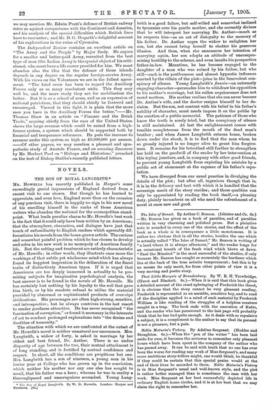Mn. HOWELLS has recently published in Harper's some exceedingly genial
impressions of England derived from a recent visit to our shores. But though he has learned to appreciate, and even love, England more than on the occasion of any previous visit, there is happily no sign in his new novel a his enrolling himself in the ranks of those American writers who abandon the national for the cosmopolitan stand- point. What lends peculiar charm to Mr. Howells's best work is the fact that it could only have been written by an American; that the atmosphere, characters, and dialogue have just that touch of unfamiliarity to English readers which agreeably dif- ferentiates his novels from the home-grown article. The curious and somewhat painful problem which he has chosen to develop and solve in his new work is no monopoly of American family.. life. But the setting and treatment are entirely characteristic of Mr. Howells ; in other words, they illustrate once more the workings of that subtle yet wholesome mind which has always found its happiest inspiration in the delineation of the finest traits of distinctively American types. If it is urged that Americans are too deeply immersed in actuality to be pro- mising subjects for imaginative psychological analysis, the best answer is to be found in the novels of Mr. Howells. He has certainly lost nothing by his loyalty to the soil that gave him birth, or by his resolute refusal to utilise the material provided by abnormal or sophisticated products of over-ripe civilisations. His personages are often high-strung, sensitive, and introspective ; but he always contrives in the last resort to render goodness attractive. He has never recognised "the fascination of corruption," or found it necessary in the interests of art to conduct prolonged explorations into "the drains and dustbins of humanity."
The situation with which we are confronted at the outset of Mr. Howells's novel is neither unnatural nor uncommon. Mrs. Langbrith, a widow of forty, is asked in marriage by her oldest and best friend, Dr. Anther. There is no undue disparity of age between the two, their mutual attachment is of long standing, and is fortified by mutual confidence and respect. In short, all the conditions are propitious but one. -Mrs. Langbrith has a son of nineteen, a young man in his junior year at College who has grown up in the conviction, which neither his mother nor any one else has sought to assail, that his father was a hero ; whereas he was in reality a thoroughpaced and unscrupulous scoundrel. Young Lang- • The Son of Royal, Langbrith. By W. D. Howells. London: Harper and brith is a good fellow, but self-willed and somewhat inclined to tyrannise over his gentle mother, and she correctly divines that he will interpret her. marrying Dr. Anther—much as he respects him—as an act of disloyalty to the memory of his father. Dr. Anther urges the widow to enlighten her son, but she cannot bring herself to shatter his generous illusion. And thus, when she announces her intention of marrying again, her son adopts an attitude of uncompro- mising hostility to the scheme, and even insults his prospective father-in-law. Meantime, he has become engaged to the daughter of a man who was ruined by his father, but who still—such is the posthumous and almost hypnotic influence exerted by the villain of the plot—joins in the benevolent con- spiracy of silence. Young Langbrith's flancge—an extremely engaging character—persuades him to withdraw his opposition to his mother's marriage, but his sullen acquiescence does not mend matters. His mother realises that she can never become Dr. Anther's wife, and the doctor resigns himself to her de- cision. But the son, not content with his belief in his father's nobility of character, must needs impose it on the public by the erection of a public memorial. The patience of those who know the truth is sorely tried, but the conspiracy of silence is still maintained. At last the enlightenment comes with terrible completeness from the mouth of the dead man's brother ; and when James Langbrith returns home, 'broken down under the shock, it is to find that the man whom he so grossly injured is no longer alive to grant him forgive- ness. It remains for his betrothed still further to strengthen her hold on the goodwill of the reader by her intervention at this trying juncture, and, in company with other good friends, to prevent young Langbrith from expiating his mistake by a public act of atonement at the expense of his father's repu- tation.
We have diverged from our usual practice in divulging the details of the plot ; but after all, ingenious though that is, it is in the delicacy and tact with which it is handled that the sovereign merit of the story resides ; and those qualities can only be appreciated by reading the book itself,—a pleasing duty, plainly incumbent on all who need the refreshment of a novel at once new and good.














































 Previous page
Previous page